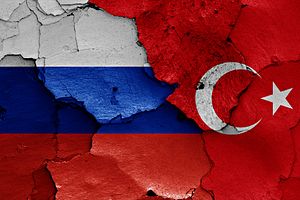The news in late June that Russia and Turkey were making noticeable moves toward repairing relations damaged last year when a Russian jet was shot down by Turks along the border with Syria was overshadowed by a terrorist attack at the Istanbul airport on June 28. Unrelated as the two events were, the news cycle quickly spun away from the diplomatic re-engagement between Ankara and Moscow.
Still, the softening of tensions between the two countries seems to have accelerated following the coup attempt on July 15.
Amid the swirl of details and rumors about the coup attempt was an interesting anecdote: the pilots involved in the shooting down of the Russian Su-24 on November 24, 2015 had apparently been among the coup-staging faction. On July 19 a Turkish official told journalists, “Two pilots who were part of the operation to down the Russian Su-24 in November 2015 are in custody.”
Ankara quickly laid blame for the coup at the feet of Fethullah Gülen, an exiled cleric and founder of a transnational social and religious movement that sponsors schools, business associations, and cultural programs around the world. According to the mayor of Ankara, Melih Gokcek, in an interview with CNN, the pilots were Gulenists. His comments, noted by Al Jazeera, referenced the so-called parallel state Turkish President Recep Tayyip Erdoğan says Gülen has created. Gokcek blamed “the parallels” for the spike in Russian-Turkish tensions. “That incident [the downing of the Russian plane] was orchestrated by a pilot who belongs to the parallel state,” he said. “I say this one hundred percent. We were not voicing this before, we were gulping this down… But, now I say this, as Melih Gokcek, these rascals caused the rift between Russia and us.”
“Why? Because they wanted to isolate us in world politics. Yesterday I had a guest from Russia, an adviser for Putin. He agrees with me,” Gokcek said.
This week, Turkish Deputy Prime Minister Mehmet Simsek told journalists that the decision to shoot down the Russian jet “was taken personally by the pilot.”
“Turkey has no hostile feelings to Russia, and will never have,” he continued, according to TASS.
Turkey’s present position–which appears to be that the pilots acted on their own and that the November downing of the Russian jet was part of a wider Gulenist conspiracy–is quite a far distance from the position it maintained regarding the shoot down for the past seven months.
After the incident, which took place along the Turkish-Syrian border, Turkish officials stridently argued that their pilots had acted within the declared rules of engagement.
Turkey and Russia traded barbed letters over the subsequent months with the UN Security Council. Turkey claimed in a letter the day of the downing that two Su-24 jets had approached Turkish airspace and ignored 10 warnings in five minutes. One jet left while the the other entered Turkish airspace, at which time it was fired upon “by Turkish F-16s performing air combat patrolling in that area in accordance with the rules of engagement.” In April, Russia sent a letter to the UN accusing Turkey of working with ISIS to smuggle oil out of the war zone and thus helping supply the militant group with funds and weapons. Turkey replied with a letter calling the Russian allegations “baseless.”
In the wake of the coup attempt, Ankara has radically revised recent history, to say the least.
Regardless of how many in the West viewed Erdoğan and his increasingly authoritarian tendencies, democratic leaders lined up in support of the elected Turkish government–in no small part because of the critical role Turkey plays in addressing the Syrian crisis. Ankara is convinced Gulenists were behind the coup, but has presented little evidence beyond confessions (likely extracted with torture). As Turkish officials pursue a widening crackdown against anyone the state can even tangentially link to the coup attempt–be they military members, school teachers, or journalists–the country’s allies will cringe. Except those in Moscow, it seems.
Erdoğan, Simsek said July 26, would be traveling to St. Petersburg to meet with Russian President Vladimir Putin.
































